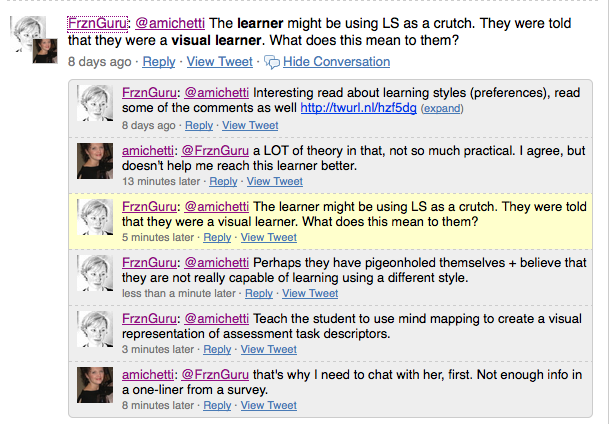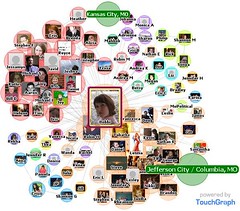I’ve tweeted it before, last time back in June:

I regularly ask my students to reflect on their work and our class in general. Embedded in this reflection task is my not-so-subtle request for feedback on how I’m doing as a teacher: Are you learning something? If so, what?
… and I hope that the answer is something along the lines of what I think I’ve been teaching. Honestly, the response usually is, and so I give myself a pat on the back and move on.

But every time – and I do mean every time – I ask my students for feedback, I get at least one surprise, sometimes several. In fact, now that I think about it, I realize that perhaps this is the main reason I continue to ask my students for “please-may-I-get-inside-your-head” feedback: because my students (especially the middle-schoolers) always surprise me, and I get such a thrill from it. I mean, yes – I am asking for feedback to inform and guide my teaching. Everything from next week to next year is considered and reconsidered as I chart, graph, and make notes about what my students have said. But sometimes I am merely charmed by the simplicity and honesty of my students comments. Further than that – and this is when it really gets good – is when I’m challenged by them.

My mid-year feedback and reflection requests are very open and not at all numerical, incidentally. I allow students to respond in any number of words, in a Zoomerang online survey with an open text box. You can see here what my questions look like.
Note that if you’d like to see an entire sample survey, check one out here – you’ll have to fill something in the boxes to get past each page but don’t worry; I’m pretty sure I’ll know you’re not one of my middle-schoolers!
I’ll share some examples from the most recent batches, submitted this week, as we roll into the second quarter of our school year at UNIS Hanoi. First, Rebecca in 7th grade, who knows what she is getting from English class, as she responds to my first sentence-starter, What I have definitely learned this quarter is…
I learned how to write good blogs by using textual evidence and refering to what the author is doing. When i read ‘Dragons Gate’ in class learned alot about how hard it was when the chinese had to go work in America and how it affected their lives. When doing DLAs i have also learned important grammar rules like when you are talking about a book or a movie, play that is named you have to either put it in italics or underline it.
(You’ll notice that I’ve typed Rebecca’s comments “as is.”) Not only is Rebecca able to articulate what she’s getting out of our English class (remarkably concise for a 7th-grader!), but she obviously also knows herself as a learner and she decided to share this tidbit with me, too, when prompted with Other thoughts I have that will help Ms. Michetti help me to learn:
I am a visual learner and i find it hard to learn things or understand things when they are presented in large blocks of text.
Initially, I was concerned about this and wondered what that meant for learning in our classroom (by nature of the subject area, rather text-heavy). A conversation with a different Rebecca (@FrznGuru, a member of my PLN on Twitter) made me realize I needed to chat with Grade-7-Rebecca to find out what her reason was for including this tidbit of info:

So I chatted with Grade-7-Rebecca. Turns out, she’s not bothered by the amount of text in our class; she was quite open in telling me that she’s having no problems in English A class with our texts, but wanted me to know for any “future projects or things like that” so that I could help her by giving her visual cues. Fair enough!
My primary concern was wondering how to help a visual learner in a course where the strands of writing, listening, reading, speaking, and representing are also important, but Rebecca seemed to understand this quite well and knew that although reading and writing might not be her strengths, she needs to work on them. We ended up having a thorough (and useful, at least for me) conversation about learning in English class.
Other than Rebecca’s generous comments, I get plenty of tidbits from students offering suggestions, which I note, as to how I can help them and others learn more in class, such as these articulate ones:
Other thoughts I have that will help you helpme learn, are having reading classes. I really enjoy them, and it is nice to take a short break once in a while. We are then ready to learn after having a short break.
And:
I think spending a bit more time explaining what you need to do for blogging in the unit, such as the fact that you need to post your roles on the blog before each meeting would help me understand the unit quicker.
Both of the above examples are comments I appreciate very much because they are reminders of the finer aspects of my teaching I need to be mindful of as I plan.
Ah, but what about those comments that really make me go, “Hmmmm”? Next, an example of a student who challenges me to do more:
I think we should do more activities that are off our bums! I want to move more in english, and play games. I’m sure more people would like that too 🙂 It’s also a really entertaining way to learn! I also think that we could interact with more groups of people. If we get to talk with our friends it MIGHT (yes, I’m saying MIGHT) make us feel like English is more enjoyable, so we will look forward to it more than we already do! 🙂
So now I understand that perhaps in our first quarter, for this student, we weren’t doing enough to physically move around and socialize. And I’m already thinking, How can we move around more in our next unit, and beyond? These are the kinds of comments I love because they really do challenge me to reflect on my own practice and make changes to adapt to my students’ needs.
Other gems I appreciate are the comments where one of my students tells me that what they’ve learned this quarter isn’t in fact related to any of our curriculum content, but rather is about how they learn or why we learn. Some examples:
I have defenitly learned how to properly blog and reflect in this unit. I have also learned that when your in a group or group work going for one thing that you should make sure that your all on the same page or else if you contradict that person then the person that is assessing you they might see that your not prepared.
And this one from Grade 8:
In this quarter I feel that i have really got a better understanding of the topic theme: ‘Identity and Belonging’. I also feel that I have also learned more about myself in a sense that I have gotten to appreciate books such as ‘The Outsiders’ more.
Of course there are always the “Life is so hard” adolescent whinges here and there, like this one from Grade 9, in response to the sentence starter “What I don’t like about this class is…:
I didn’t like that we did not read the book, Animal farm, very often in class even though we were expected to read it at home
And again from Grade 9:
that it still is work.
But despite even these comments, I certainly find that the surveys I get from my students help guide me as a facilitator of their learning. I feel I not only have a better pulse on each of my classes, but I’m challenged to think of ways to reach each student that perhaps I would not have thought without their input.
And so, I’ll continue to solicit their feedback! However, I think next time I do, I might change the way I do things and take Kevin‘s advice about using GoogleDocs Forms. Thanks, Kevin! And of course, thanks to all my students for their honest and detailed feedback — especially Rebecca, who agreed to have me write about our conversation and her comments!
Like this? You might also enjoy these:
 Dear Subscriber,
Dear Subscriber,




